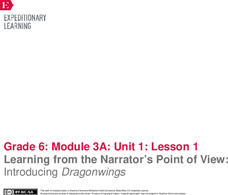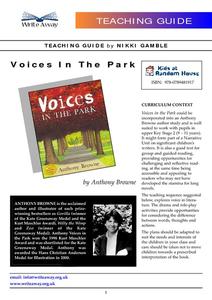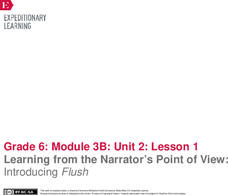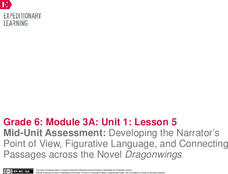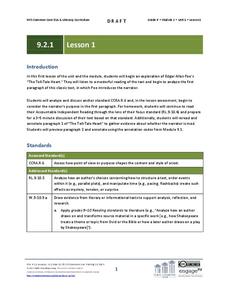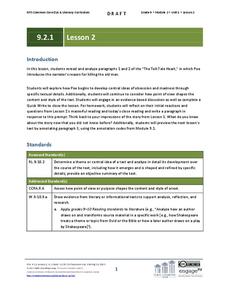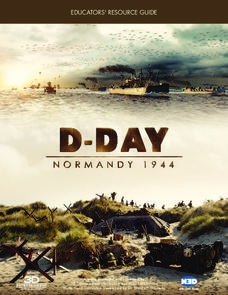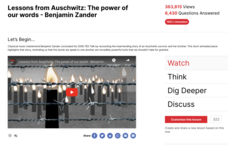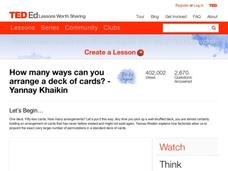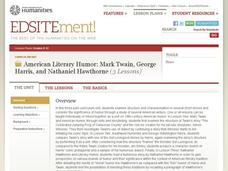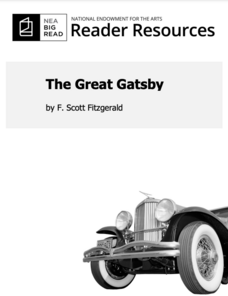EngageNY
Analyzing Point of View: Inferring about the Natural Disaster in Eight Days
Who is telling the story? Readers take a look at the text Eight Days to determine if the story is told in first or third person. They then discuss in groups and complete a shared writing activity to describe how the narrator's point of...
EngageNY
Learning from the Narrator’s Point of View: Introducing Dragonwings
Journey into the past with Laurence Yep's Dragonwings. Scholars complete anchor charts to analyze techniques the author uses to develop the narrator's point of view in his novel. As they read, pupils also complete word catchers to track...
National Endowment for the Humanities
Edgar Allan Poe, Ambrose Bierce, and the Unreliable Narrator
Stories by Edgar Allan Poe and Ambrose Bierce provide readers with an opportunity to investigate unreliable narrators. The lesson plan begins with an activity about different types of point of view and continues as scholars apply their...
EngageNY
Analyzing Point of View: Inferring about the Impact of Hurricane Katrina on People Living in New Orlean
What, where, how? Readers hone their analysis skills as they determine the narrator's point of view in Eight Days. They complete a literary analysis chart and essay to describe what and where events take place. Individuals then discuss...
Write Away!
Voices In the Park
Explore the impact a narrator's point of view has on a story with a reading of the children's book, Voices in the Park by Anthony Browne. Written in four different voices, the story is told and retold from different perspectives to...
EngageNY
Learning from the Narrator’s Point of View: Introducing Flush
It is all down the drain. Scholars read chapter one of Flush and write any unfamiliar words in their word catchers and identify the narrator and point of view of the story. Pupils complete a point of view anchor chart and use Thought,...
Novelinks
The View From Saturday: Concept/Vocabulary Analysis
Design your unit on The View From Saturday by E.L. Konigsburg with a concept and vocabulary analysis resource. It outlines the plot, literary elements, vocabulary issues, and any possible considerations for planning a differentiated...
EngageNY
Mid-Unit Assessment: Developing the Narrator’s Point of View, Figurative Language, and Connecting Passages across the Novel Dragonwings
Let's get creative! As part of a mid-unit assessment, scholars create a piece of artwork illustrating the theme from Laurence Yep's novel, Dragonwings. Additionally, pupils use a graphic organizer to identify figurative language in the...
EngageNY
Mid-Unit Assessment: Analyzing a New Narrative about a Natural Disaster, Part II
See it through my eyes. Scholars complete mid-unit assessment part II by writing an essay describing how the narrator's point of view influences how the story is told in the text In the Middle of the Storm. Pupils also complete a...
EngageNY
Grade 9 ELA Module 2: Unit 1, Lesson 1
Once conceived, a guided set of literary analysis lessons will assist you day and night. Ninth graders look closely at "The Tell-Tale Heart" and analyze how Poe uses point of view to create questions about the narrator's sanity and...
EngageNY
Grade 9 ELA Module 2: Unit 1, Lesson 2
Make up your mind to complete a lesson plan about "The Tell-Tale Heart" and forever rid yourself of simple sentence structures. As ninth graders analyze the first two paragraphs of Edgar Allan Poe's short story, they consider how text...
EngageNY
Grade 9 ELA Module 2: Unit 1, Lesson 4
True, you may be very, very dreadfully nervous, but a literary analysis unit will set your mind at ease. Learners study the narrator's point of view in Edgar Allan Poe's "The Tell-Tale Heart" and analyze how it contributes to a...
Simon & Schuster
Curriculum Guide to: Wuthering Heights by Emily Brontë
Eight lessons and worksheets comprise a curriculum guide for Emily Bronte's Wuthering Heights. Class members create a timeline that includes world-historical events as well as events in the novel. They analyze the speaking styles of...
National Endowment for the Humanities
Narrative Voice in Moby Dick
Call him a reliable narrator! Ishmael is the focus of a lesson that asks readers to analyze the complex character of Herman Melville's narrator as he is introduced in the first chapter of Moby Dick.
EngageNY
Grade 9 ELA Module 2: Unit 1, Lesson 3
Hearken! and observe how well a literary analysis unit can help ninth graders read closely and connect text structure to a central idea. Focusing on Edgar Allan Poe's "The Tell-Tale Heart," learners take notes and track the development...
D-Day Normandy 1944
D-Day Normandy 1944
No study of World War II would be complete without an in-depth examination of the events of June 6, 1944. Pascal Vuong's D-Day Normandy:1944, is the perfect vehicle to convey the sheer magnitude of the events that have been called the...
Penguin Books
A Teacher's Guide to the Signet Classic Edition of Edith Wharton's Ethan Frome
Is it possible to have too much concern for others? Can we be trapped by our expectations as well as those of society? Edith Wharton's chilling tale of Ethan Frome asks these and other disquieting questions. Signet's guide to Ethan Frome...
TED-Ed
Lessons from Auschwitz: The Power of Our Words
Some words are best left unspoken. Words matter, according to Benjamin Zander, conductor, teacher, and lecturer. To illustrate his point, Zander recounts a story told to him by a survivor of Auschwitz. As a result of her experience this...
Curated OER
Fairy Tales
Class groups examine fairy tales from a feminist and a Marxist perspective, identifying how these tales present gender roles and class/power systems. The groups then script and perform their own tale that uses one of these lenses.
TED-Ed
How Many Ways Can You Arrange a Deck of Cards?
Entertain and grab your learners' attention with a short video clip that engagingly teaches the concept of a permutation and how a factorial is a wonderful shortcut for theoretical probability calculations.
Dr. Seuss Enterprises
Dr. Seuss in the Classroom
Explore the works of Dr. Seuss, such as Horton Hears a Who, Horton Hatches and Egg, The Sneetches and Other Stories, The Lorax, The Butter Battle Book, and Yertle the Turtle and Other Stories. Each story lesson includes reading...
National Endowment for the Humanities
American Literary Humor: Mark Twain, George Harris, and Nathaniel Hawthorne
Nathaniel Hawthorne as a humorist? Really? The three lessons in this series focus on the the storytelling style, conventions, and literary techniques employed by Hawthorne, George Washington Harris, and Mark Twain.
National Endowment for the Arts
Reader Resources: The Great Gatsby by F. Scott Fitzgerald
A handy guide offers high schoolers support as they read the American novel, The Great Gatsby. Complete with a biography of F. Scott Fitzgerald, a timeline of the Roaring Twenties, discussion questions about the novel, and more, this...
Southern Nevada Regional Professional Development Program
“Tell Me a Story”: Moving from Reading to Writing
Narrative essay writing is the focus of a series of exercises that model for learners how to not only read a narrative, but how to also examine the techniques fiction writers use to create a setting, develop their characters, represent...



